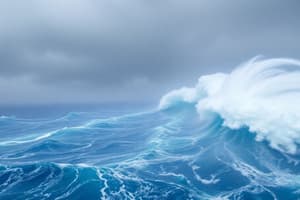Podcast
Questions and Answers
What is a tropical cyclone?
What is a tropical cyclone?
- A storm occurring in colder regions
- A storm that originates over warm tropical oceans (correct)
- A type of vortex
- A type of hurricane
Where do typhoons occur?
Where do typhoons occur?
- Indian Ocean
- North Atlantic
- South Pacific
- Northwest Pacific (correct)
What kind of air movement contributes to the formation of a typhoon?
What kind of air movement contributes to the formation of a typhoon?
- Stable air
- Descending cold air
- Rising warm moist air (correct)
- No air movement
Which of the following describes the eyewall of a typhoon?
Which of the following describes the eyewall of a typhoon?
The Philippines lies outside the typhoon belt of the Pacific.
The Philippines lies outside the typhoon belt of the Pacific.
What does an anemometer measure?
What does an anemometer measure?
The Intertropical Convergence Zone (ITCZ) is the area where ________ meet.
The Intertropical Convergence Zone (ITCZ) is the area where ________ meet.
Match the following weather instruments with what they measure:
Match the following weather instruments with what they measure:
Flashcards are hidden until you start studying
Study Notes
Tropical Cyclone
- A collective term for storms that originate in warm tropical oceans
- Includes Typhoons, Hurricanes, and Cyclones
Typhoon vs Hurricane vs Cyclone
- All refer to the same phenomenon, but names vary by location
- Typhoon: Northwest Pacific
- Hurricane: North Atlantic and Central/Eastern Pacific
- Cyclone: South Pacific and Indian Ocean
Typhoon Characteristics
- Eye: Calm winds and clear weather
- Eyewall: Maximum wind zone, characterized by heavy rain and thunderstorms
- Rainbands: Spiraling, curved bands of clouds and thunderstorms, extending outwards from eyewall
Conditions for Typhoon Formation
- Continuous evaporation and water cycles
- Differences in air pressure
- Convergent Winds
Conditions for Typhoon Formation: Continuous Evaporation and Water Cycle
- Heat drives water evaporation
- Saturated clouds become heavy with moisture, resulting in rain
Conditions for Typhoon Formation: Differences in Air Pressure
- Meteorologists monitor air pressure changes
- Increased air pressure: High-pressure area (HPA)
- Reduced air pressure: Low-pressure area (LPA)
- HPA and LPA differences create winds
Conditions for Typhoon Formation: Convergent Winds
- High-speed winds in a specific area
- Created by differences between HPA and LPA
Instruments Used to Monitor Weather
- Anemometer: Measures wind speed
- Wind Vane: Shows wind direction
- Thermometer: Measures air temperature
- Rain Gauge: Collects and measures rainfall over time
- Barometer: Measures air pressure
The Philippines and Typhoons
- Located within the Pacific typhoon belt
- Located within the Intertropical Convergence Zone (ITCZ)
- ITCZ: Where northern and southern winds converge
- ITCZ is a breeding ground for typhoons
Recent Rainfall Patterns in the Philippines
- Significant increase in rainfall due to the habagat wind
- Impacts need to be addressed by authorities.
Studying That Suits You
Use AI to generate personalized quizzes and flashcards to suit your learning preferences.




